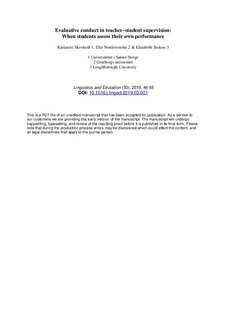Evaluative conduct in teacher–student supervision: When students assess their own performance
Journal article, Peer reviewed
Accepted version
Permanent lenke
http://hdl.handle.net/11250/2601612Utgivelsesdato
2019Metadata
Vis full innførselSamlinger
Originalversjon
Linguistics and Education. 2019, 50, 46-55.Sammendrag
The practice of evaluating one’s own performance or that of another is ubiquitous across workplaceand institutional settings and is foundational to the educational endeavour. In contrast to the tradi-tional dynamic of teachers assessing students’ performance, however, this paper focuses on how studentsevaluate their own performance in feedback meetings. Using conversation analysis, we investigate twoScandinavian educational settings in which students evaluate, reflect on and assess their own work.Analysis focuses on how evaluative practices are initiated and/or elicited by teachers, and how they alignwith or disrupt conversation analytic norms around self-assessment. We found that doing evaluationpresents interactional challenges for those eliciting, doing and responding to it, despite the core natureof assessment in educational settings. We discuss the implications for preference organisation in spe-cialised institutional settings and seek to understand what counts as assessment and evaluation in real pedagogic events. Evaluative conduct in teacher–student supervision: When students assess their own performance

